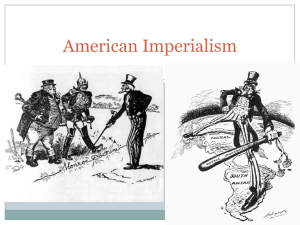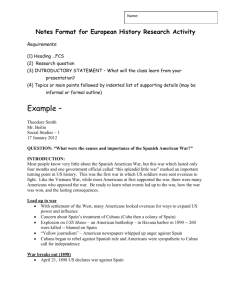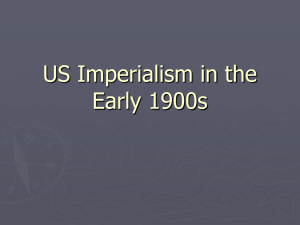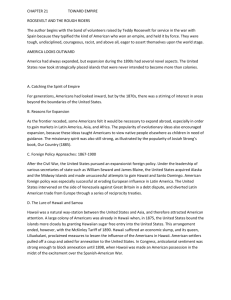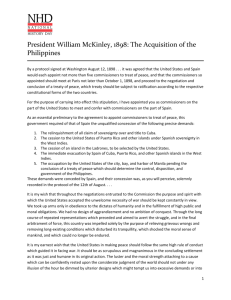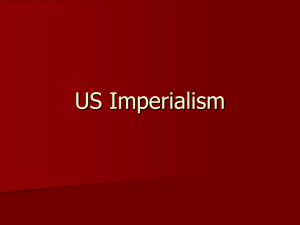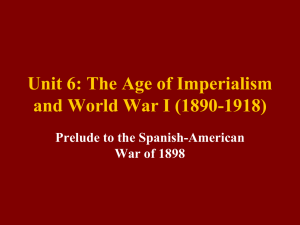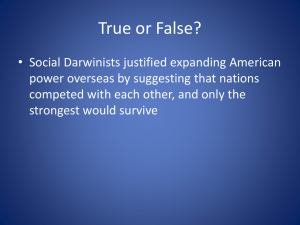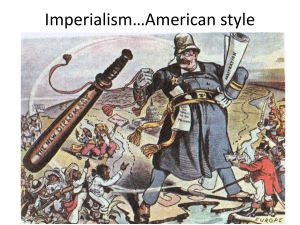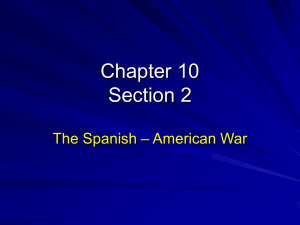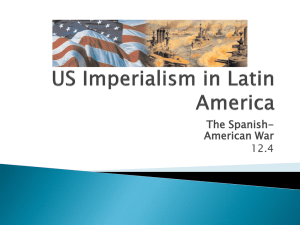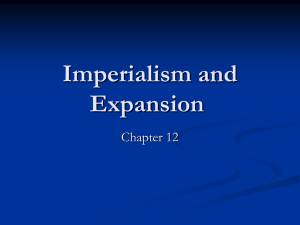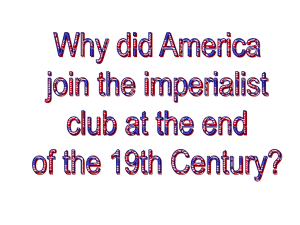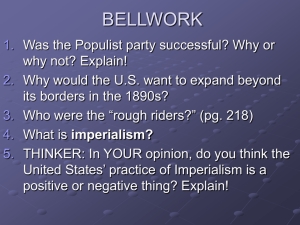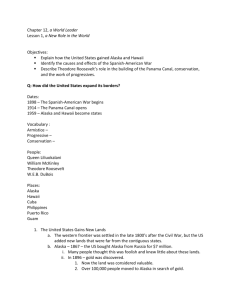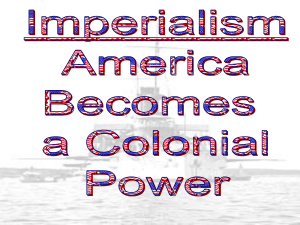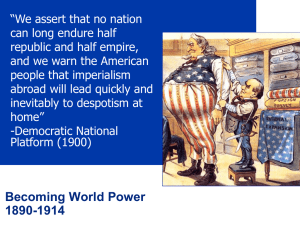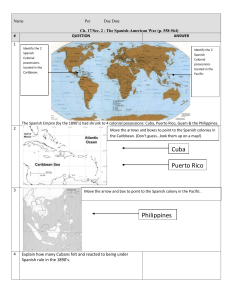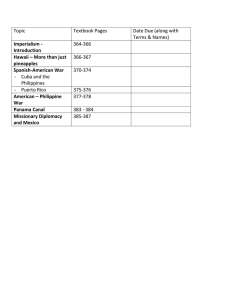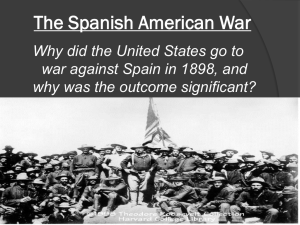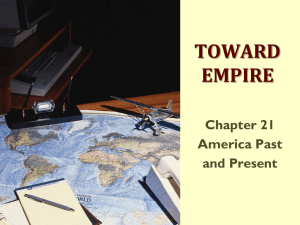Imperialism and Entering the World Stage
advertisement
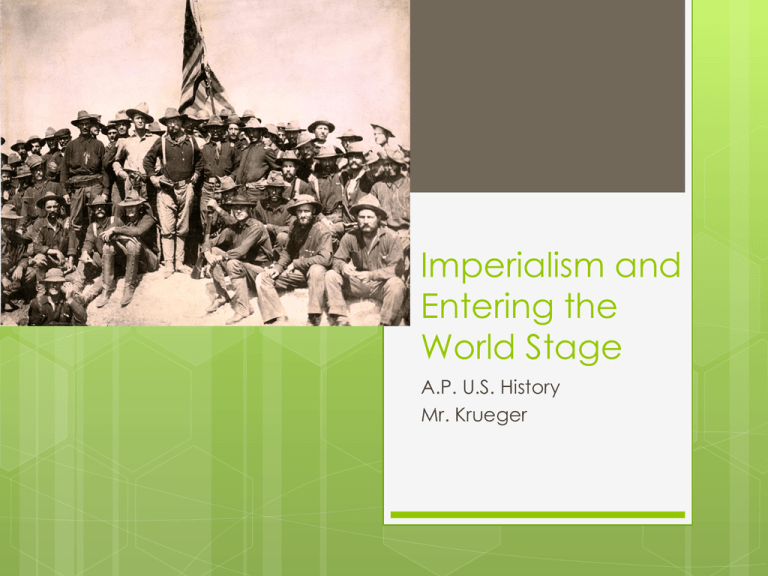
Imperialism and Entering the World Stage A.P. U.S. History Mr. Krueger Towards Empire Expansion of 1890’s differed from previous American expansions: Economics – Desire for new markets and raw materials Military – Desire for naval bases and coaling stations Ideological – Desire to bring Christianity, westernstyle culture, and democracy to other people Isolationism declines, and internationalism rose because of the increase in technology. Imperialism was not popular at the onset of the 1870’s, but would eventually come to the forefront of American Politics. Reasons for Expansion End of the Frontier – diminishing opportunities at home. New Markets Trade – Exports Nationalism leads to Imperialism Intellectuals based expansion on ideas from Charles Darwin – the fit would triumph. Biogenic Law – German biologist Ernst Haeckel – Advanced Races would conquer and protect Primitive Races Sense of Anglo – Saxon superiority and natural selection abound Foreign Policy 1870 - $395 million 1890 - $858 million 1900 - $1.4 billion Still based on Monroe Doctrine William Henry Seward wanted to expand throughout the Western Hemisphere Focus on Latin America and Hawaii Hawaii and Samoa Naval Bases and Hawaiian Sugar McKinley Tariff of 1890 hurt the sugar production in Hawaii – gave American producers two-cents a pound on Hawaiian exports. Queen Liliuokalani declared a new constitution to help her people and many natives were given rights. American residents revolted and asked the U.S. for help – the marines were sent. 3 days later the Queen surrendered. Hawaii was annexed to the U.S. Debates about the annexation – U.S. to “civilize and Christianize” the Hawaiians War with Spain Shaped all levels of American Society Nationalism and Identity North and South Reconciled after Civil War Emerged as a world power Created an Empire Left some doubt… Cuba was a remnant of Spain’s great empire – rebels fought against Spanish control With the depression, a revolt broke out and many tried to sway American opinion to help the Cuban rebels. Rebels used a hit and run, and scorched earth policy. Spain tried to systematically wipe them out. When this did not work, Spain sent General Valeriano Weyler y Nicolau – he used “reconcentration” camps – thousands enter, 1/3rd die Yellow Journalism Yellow Journalism – sensationalist reporting, named after the “Yellow Kid,” a popular comic strip that was used William Randolph Hearst - Published the New York Journal Joseph Pulitzer – Published the New York World Both Supported the Cuban Rebels and used biased sources to sell more papers Causes for War American anger over the treatment of Cubans The outrage over the de Lome Letter, a letter written by Enrique Dupuy, Spain’s minister to the United States. The sinking of the Maine off of Havana Harbor – February 15, 1898 Blew up and killed 260 soldiers – Spain took the blame. Teller Amendment – promise that the U.S. had no intention of annexing Cuba. Mechanics of the War The first time the United States fought as one after the Civil War… North and South together with African American troops Many Volunteers join because of Nationalism Troops were poorly supplied, but the war did not last long… Road to War…1898 The Philippines – the start of the war Spain held the islands since 1500 The United States Navy was led by Commodore George Dewey The United States had the advantage of modern technology, iron and steel hulls, and superior weapons. Quickly overwhelmed the Spanish. No American Casualties, 400 Spanish died War in the Philippines Dewey began to plan an attack on the capital of Manila Aided by Emilio Aguinaldo – Leader of a rebel army of Filipino patriots Helped Spanish Americans capture Manila Forces in the Philippines surrendered on August 14, 1898. The War moves to Cuba The Rough Riders – Volunteer Calvary lead by Theodore Roosevelt. Composed of college athletes, cowboys, ranchers, and miners. Battle of San Juan Hill Battle of Santiago – U.S. Victory – July 3, 1898 Outcome U.S. Victory – Annexation of the Philippines, Puerto Rico, and Guam. The war cost the United States $250 Million and about 2,000 soldiers died, not from combat but from YELLOW FEVER. Creation of an Imperialist United States and a presence on the World Stage. Progressivism – A Review in Progress Progressivism – movement started to address the problems created by industrialization. Muckrakers – journalists who exposed the filth of society Jacob Riis – “How the Other Half Lives” Ida Tarbell – Attack on Standard Oil Upton Sinclair – “The Jungle” “Fighting Bob” La Follette Housing Reforms Work reforms Tenement Act of 1901 Triangle Shirtwaist Company Fire Government Reforms Robert La Follette Wisconsin Idea: policy to apply the expertise of the state's university to social legislation that benefited all the state's citizens It led to classic programs such as regulation of utilities, workers' compensation, tax reform, and university extension services T.R. – President Roosevelt Bully Pulpit – a powerful platform to publicize important issues and seek support for his policies. HANDS ON POLITICS Square Deal Regulating Big Business and Promoting Responsibility Preserving the Natural Resources John Muir – Naturalist, leave Nature alone Gifford Pinchot - Conservationist, use wisely President Wilson The New Freedom – platform that called for tariff reductions, banking reforms, and stronger anti-trust legislations. Graduated Income tax – the more $$ you have, the more taxes you pay. Federal Reserve Act – created a central fund from which banks could borrow to prevent collapse during a financial panic. The 19th Amendment Both Reformers Passed Progressive laws to help the U.S. These limited big business Gave rights to the workers Both aided in civil rights, and both had controversial incidents Brownsville Incident – Roosevelt signed papers discharging 167 falsely accused African American soldiers. Wilson opposed federal anti-lynching laws, and allowed cabinet members to segregate their offices.
